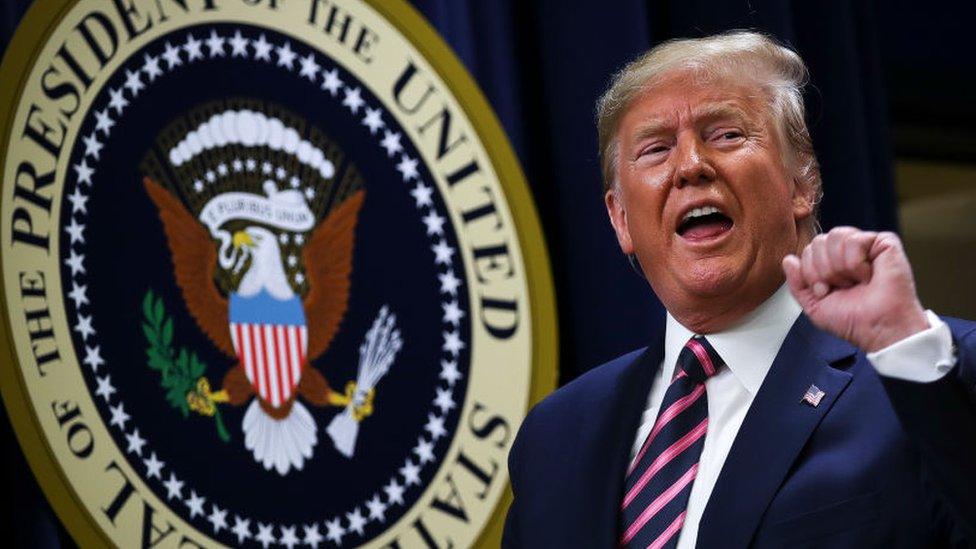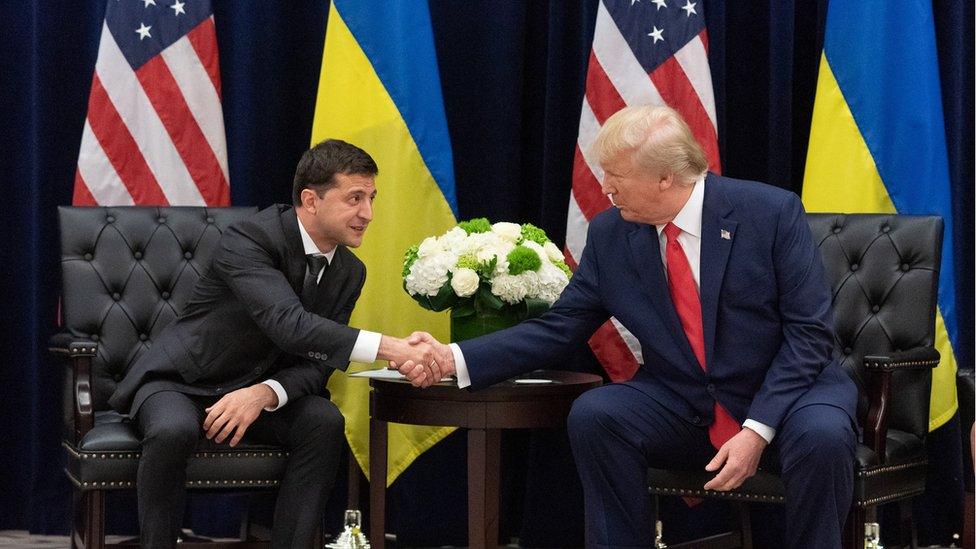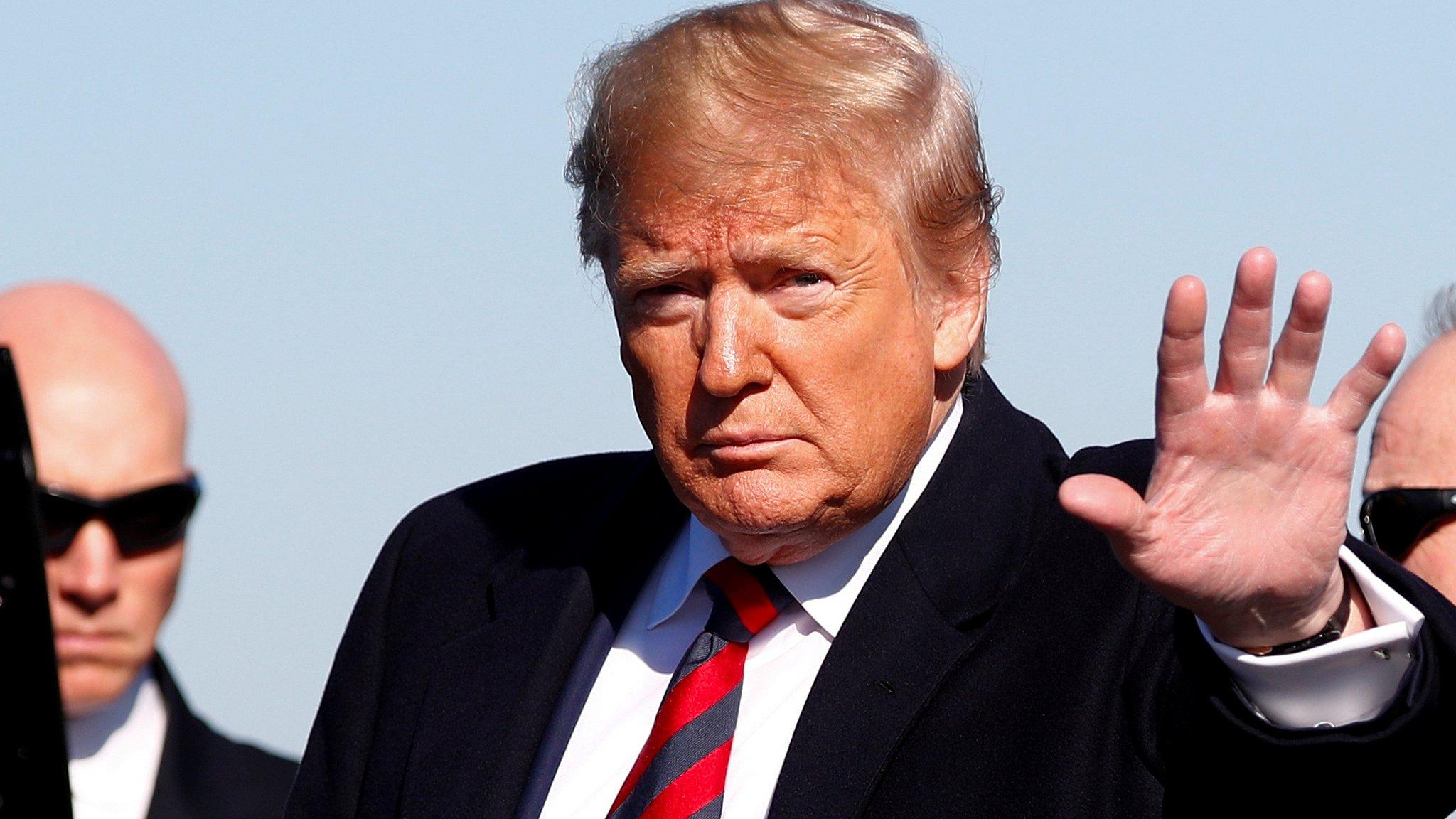Trump faces criticism after sharing tweet naming alleged whistleblower
- Published

US President Donald Trump is facing staunch criticism for retweeting a post that included the alleged name of the whistleblower whose complaint led to the president's impeachment.
Mr Trump shared a post from a user named @surfermom77, who described themselves as a "100% Trump supporter".
The retweet seemed to disappear from the president's timeline for a period but was visible again later.
Mr Trump has repeatedly called for the whistleblower to be identified.
In November, lawyers for the whistleblower - who is said to work in the US intelligence community - issued a cease-and-desist warning to the president, saying their client was "in physical danger". But the president ignored the warning and continued to call for them to be named.
The US has federal laws that guarantee the protection of whistleblowers, designed to shield those who come forward with evidence of wrongdoing by the government.
'Hallmarks of a bot'
Previous posts by @surfermom77 - the Twitter user retweeted by President Trump - include anti-Islam content and posts spreading the false conspiracy theory that President Barack Obama was a Muslim.
According to a report by the Associated Press, external, the account bears the hallmarks of an automated "bot" account, "including an unusually high amount of activity and profile pictures featuring stock images from the internet".
The account's profile picture - a stock photo of a woman in business attire that was pulled from the internet - was changed on Saturday to an image of Mr Trump.
Facebook has a policy of banning posts that name the alleged whistleblower, the New York Times reported, but Twitter does not. In a statement issued to the Associated Press, Twitter said the @surfermom77 tweet was "not a violation of the Twitter Rules".
Did the president delete the retweet?
There was some speculation about whether Mr Trump deleted the retweet after the outcry.
Twitters users said they were unable to see the post on his timeline on Saturday morning, after he shared it at around midnight on Friday.
On Saturday afternoon, Twitter said there had been a glitch in its system, which had made some tweets invisible to some users, although the company did not specify how many people were affected or make a direct connection to this specific controversy.
Allow X content?
This article contains content provided by X. We ask for your permission before anything is loaded, as they may be using cookies and other technologies. You may want to read X’s cookie policy, external and privacy policy, external before accepting. To view this content choose ‘accept and continue’.

The retweet was visible again in the president's feed by Sunday morning. His account is followed by 68 million people.
What was the reaction?
The president had already faced criticism from Democratic leaders over his ongoing efforts to publicise the whistleblower's identity.
In response to his retweet on Saturday, attorney Stephen Kohn, an expert in whistleblower protection laws, told the Washington Post that the president was violating his duty to safeguard whistleblowers.
"The paradox is that it was the president's duty to protect this person," Mr Kohn said. "It's inconceivable that he not only doesn't do it, but violates it."
A former whistleblower told the Associated Press that the ease with which the person's identity had been spread online demonstrated the need for greater legal protection.
Michael German, who left the FBI after reporting allegations of mismanagement, said it was "completely inappropriate for the president of the United States to be engaged in any type of behaviour that could harm a whistleblower".

The controversy centres around a call between Ukraine's President Volodymyr Zelensky and President Trump
With a wealth of first-hand testimony, Democrats have moved the impeachment on from the whistleblower's evidence. But the president and other Republicans have worked to keep the whistleblower in the press.
In an audio recording that emerged in September, President Trump was heard comparing the whistleblower's sources to a "spy". Then in an apparent reference to the execution of spies by the US in the past, he said: "You know what we used to do in the old days when we were smart? Right? With spies and treason, right? We used to handle them a little differently than we do now."
According to reports in the Washington Post and the Guardian, the person named by right wing media as the whistleblower was receiving a spike in threats when the president tweeted about them, and was being driven to and from work by armed security officers following the threats.
How did the whistleblower become involved?
In August, the whistleblower filed a report expressing concern over a phone call a month earlier in which Mr Trump asked his Ukrainian counterpart Volodymyr Zelensky to investigate Joe Biden, a Democratic front-runner for the 2020 US presidential election.
Democrats said the call transcript showed President Trump abusing the power of his office to pressure President Zelensky to damage a US Democratic political rival. President Trump defended the call, saying it was "perfect". He has dismissed the impeachment process as a "witch-hunt".
"Cheapened the process of impeachment" - Trump reacts at a rally
The whistleblower's report led ultimately to an inquiry in the House of Representatives which culminated in the president's impeachment on charges of abuse of power and obstruction of Congress, making Mr Trump only the third president in US history to be impeached.
The president now faces a trial in the Republican-controlled Senate, which is expected to acquit him along party lines.

Want to find out more?

A SIMPLE GUIDE: If you want a basic take, this one's for you
GO DEEPER: Here's a 100, 300 and 800-word summary of the story
WHAT'S IMPEACHMENT? A political process to remove a president
VIEW FROM TRUMP COUNTRY: Hear from residents of a West Virginia town
CONTEXT: Why Ukraine matters to the US
FACT-CHECK: Did Ukraine interfere in the 2016 election to help Clinton?
CASE FOR & AGAINST: What legal scholars say about Trump conduct

- Published19 December 2019

- Published19 December 2019
- Published19 December 2019
